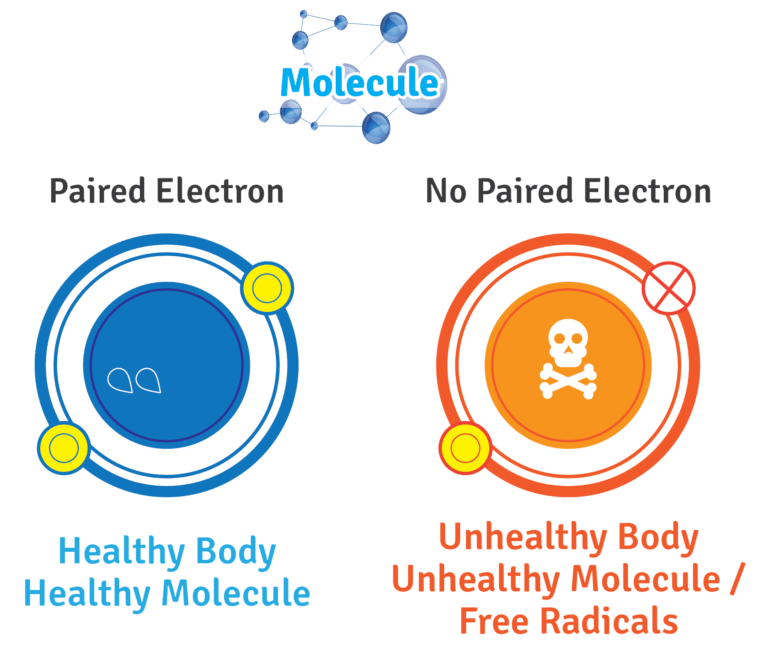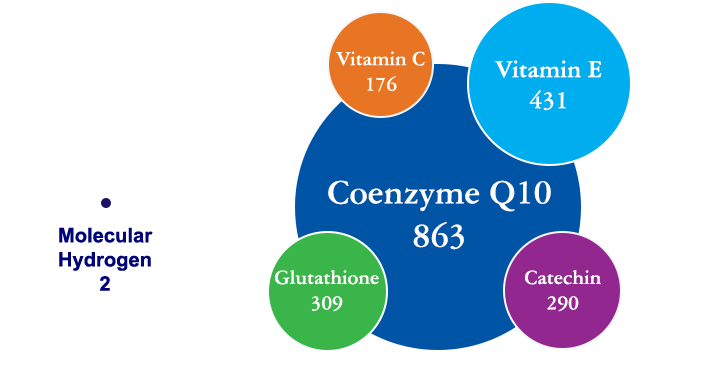#Cancer
A Systematic Review of Molecular Hydrogen Therapy in Cancer Management
Muhammad Nooraiman Zufayri Mohd Noor, Adlin Sofea Alauddin, Yin How Wong, Chung Yeng Looi, Eng Hwa Wong, Priya Madhavan, Chai Hong Yeong
Asian Pacific Journal of Cancer Prevention, Vol 24 (2023)
#role of molecular hydrogen in ERW
Electrolyzed–Reduced Water: Review I. Molecular Hydrogen Is the Exclusive Agent Responsible for the Therapeutic Effects
Tyler W. LeBaron, Randy Sharpe and Kinji Ohno
International Journal of Molecular Sciences 2022, 23, 14750 (2022)
#Respiratory
Diagnosis and Treatment Protocol for Novel Coronavirus Pneumonia
Diagnosis and Treatment Protocol for Novel Coronavirus Pneumonia (2020)
#Gout
TRPA1 receptor stimulation by hydrogen peroxide is critical to trigger hyperalgesia and inflammation in a model of acute gout
Gabriela Trevisan, Carin Hoffmeister, Mateus Fortes Rossato, Sara Marchesan Oliveira, Mariane Arnoldi Silva, Cássia Regina Silva, Camilla Fusi, Raquel Tonello, Daiana Minocci, Gustavo Petri Guerra, Serena Materazzi,
Romina Nassini, Pierangelo Geppetti, Juliano Ferreira
Free Radical Biology and Medicine (2014)
#Cancer
Therapeutic potential of molecular hydrogen in ovarian cancer
Lei Shang, Fei Xie, Jiala Li, Yating Zhang, Mengyu Liu, Pengxiang Zhao, Xuemei Ma, Tyler W. Lebaron
Transl Cancer Res (2018)
#Joints
Therapeutic efficacy of infused molecular hydrogen in saline on rheumatoid arthritis: A randomized, double-blind, placebo-controlled pilot study
Toru Ishibashi, Bunpei Sato, Shinji Shibata, Takaaki Sakai, Yuichi Hara, Yuji Naritomi, Samon Koyanagi, Hiroshi Hara, Tetsuhiko Nagao
International Immunopharmacology (2014)
#Metabolic Syndrome
The Effects of 24-Week, High-Concentration Hydrogen-Rich Water on Body Composition, Blood Lipid Profiles and Inflammation Biomarkers in Men and Women with Metabolic Syndrome: A Randomized Controlled Tria
Tyler W LeBaron, Ram B Singh, Ghizal Fatima, Kumar Kartikey, Jagdish P Sharma, Sergej M Ostojic, Anna
Gvozdjakova, Branislav Kura, Mami Noda, Viliam Mojto, Mohammad Arif Niaz, Jan Slezak
Dovepress: Diabetes, Metabolic Syndrome and Obesity: Targets and Therapy (2020)
#Joints
Molecular Hydrogen: New Antioxidant and Anti-inflammatory Therapy for Rheumatoid Arthritis and Related Diseases
Toru Ishibashi
Current Pharmaceutical Design (2013)
#Oxidative Stress
Hydrogen acts as a therapeutic antioxidant by selectively reducing cytotoxic oxygen radicals
Ikuroh Ohsawa, Masahiro Ishikawa, Kumiko Takahashi, Megumi Watanabe, Kiyomi Nishimaki, Kumi Yamagata, Ken-ichiro Katsura, Yasuo Katayama, Sadamitsu Asoh & Shigeo Ohta
Nature Publishing Group (2007)
#Oxidative Stress
Recent Progress Toward Hydrogen Medicine: Potential of Molecular Hydrogen for Preventive and Therapeutic Applications
Shigeo Ohta
Current Pharmaceutical Design (2011)
Recent Advances in Hydrogen Research as a Therapeutic Medical Gas
Chien-Sheng Huang, Tomohiro Kawamura, Yoshiya Toyoda and Atsunori Nakao
Free Radical Research (2010)
#Kidney
Oral hydrogen water prevents chronic allograft nephropathy in rats
Jon S. Cardinal, Jianghua Zhan, Yinna Wang, Ryujiro Sugimoto, Allan Tsung, Kenneth R. McCurry, Timothy R. Billiar and Atsunori Nakao
Kidney International (2010)
#Heart/Blood Vessels
A New Approach for the Prevention and Treatment of Cardiovascular Disorders. Molecular Hydrogen Significantly Reduces the Effects of Oxidative Stress
Tyler W. LeBaron, Branislav Kura, Barbora Kalocayova, Narcis Tribulova and Jan Slezak
MDPI Molecules (2019)
#Infection/Sepsis
Molecular Hydrogen Therapy Ameliorates Organ Damage Induced by Sepsis
Yijun Zheng and Duming Zhu
Hindawi (2016)
#Obesity/Diabetes
Molecular Hydrogen Improves Obesity and Diabetes by Inducing Hepatic FGF21 and Stimulating Energy Metabolism in db/db Mice
Naomi Kamimura, Kiyomi Nishimaki, Ikuroh Ohsawa and Shigeo Ohta
nature publishing group (2011)
#Skin
MOLECULAR HYDROGEN IN WATER IS GREAT FOR SKIN
(2019)
#Eyes
Molecular Hydrogen Effectively Heals Alkali-Injured Cornea via Suppression of Oxidative Stress
Cestmir Cejka, Jan Kossl, Barbora Hermankova, Vladimir Holan, and Jitka Cejkova
Hindawi Oxidative Medicine and Cellular Longevity (2017)
#Alzheimer’s Disease
Molecular Hydrogen as an Emerging Candidate for Preventing Alzheimer’s Disease
Shigeo Ohta, and Takashi Asada
International Journal of Alzheimers & Neurological Disorders (2018)
#COVID-19
Molecular hydrogen as an adjuvant therapy may be associated with increased oxygen saturation and improved exercise tolerance in a COVID-19 patient
Ram B. Singh, Ghazi Halabi, Ghizal Fatima, Richa H. Rai, Alexander T. Tarnava, Tyler W. LeBaron
Wiley Clinical Case Reports (2021)
#Nerves
Molecular Hydrogen Attenuates Neuropathic Pain in Mice
Masanori Kawaguchi, Yasushi Satoh, Yukiko Otsubo, Tomiei Kazama
PLOS ONE (2014)
#Obesity/Diabetes
Molecular hydrogen stimulates the gene expression of transcriptional coactivator PGC-1α to enhance fatty acid metabolism
Naomi Kamimura, Harumi Ichimiya, Katsuya Iuchi and Shigeo Ohta
nature partner journals (2016)
#Heart/Nervous System
Molecular and Cellular Mechanisms Associated with Effects of Molecular Hydrogen in Cardiovascular and Central Nervous Systems
Miroslav Barancik, Branislav Kura, Tyler W. LeBaron, Roberto Bolli, Jozef Buday and Jan Slezak
Antioxidants (2020)
#Organ Preservation
Organ preservation solution containing dissolved hydrogen gas from a hydrogen absorbing alloy canister improves function of transplanted ischemic kidneys in miniature pigs
Eiji Kobayashi, Motoaki Sano
PLOS ONE (2019)
#Heart/Kidney
Intake of water with high levels of dissolved hydrogen (H2) suppresses ischaemia-induced cardio-renal injury in Dahl salt-sensitive rats
Wan-Jun Zhu, Masaaki Nakayama, Takefumi Mori, Keisuke Nakayama, Junichiro Katoh, Yaeko Murata, Toshinobu Sato, Shigeru Kabayama and Sadayoshi Ito
Nephrology Dialysis Transplantation (2010)
#Heart
Insufflation of Hydrogen Gas Restrains the Inflammatory Response of Cardiopulmonary Bypass in a Rat Model
Yutaka Fujii, Mikiyasu Shirai, Shuji Inamori, Akito Shimouchi, Takashi Sonobe, Hirotsugu Tsuchimochi, James T. Pearson, Yoshiaki Takewa, Eisuke Tatsumi, and Yoshiyuki Taenaka
Artificial Organs (2012)
#Brain
Hydrogen therapy: from mechanism to cerebral diseases
Cheng-lin Liu, Kai Zhang, Gang Chen
Med Gas Res (2016)
#Ageing/well-being
HYDROGEN: THERAPEUTIC POTENTIAL IN WELLNESS AND MEDICINE
M. Lemaire, F. Barbier
Journal of Aging Research & Clinical Practice (2017)
#Immune System/Oxidative Stress
Hydrogen‑rich water reduces inflammatory responses and prevents apoptosis of peripheral blood cells in healthy adults: a randomized, double‑blind, controlled trial
Minju Sim, Chong‑Su Kim, Woo‑Jeong Shon, Young‑Kwan Lee, Eun Young Choi & Dong‑Mi Shin
Scientific Reports natureresearch (2020)
#Kidney
Hydrogen Rich Water Attenuates Renal Injury and Fibrosis by Regulation Transforming Growth Factor-β Induced Sirt1
Zhaoyu Xing, Wanma Pan, Jing Zhang, Xianlin Xu, Xuemei Zhang, Xiaozhou He, and Min Fan
Biol. Pharm. Bull. 40, 610–615 (2017) (2017)
#Viral Infections
Hydrogen Medicine Therapy: An Effective and Promising Novel Treatment for Multiple Organ Dysfunction Syndrome (MODS) Induced by Influenza and Other Viral Infections Diseases?
Ming Yang, Zheng Zhang, Bo Gao, Lihua Liu, Taohong Hu
Symbiosis (2017)
#Gastric Cancer
Hydrogen inhibits the proliferation and migration of gastric cancer cells by modulating lncRNA MALAT1/miR-124-3p/ EZH2 axis
Baocheng Zhu, Hengguan Cui and Weiqiang Xu
Cancer Cell International (2021)
#Antioxidation, excercise medication
Hydrogen gas: from clinical medicine to an emerging ergogenic molecule for sports athletes
Tyler W. LeBaron, Ismail Laher, Branislav Kura, and Jan Slezak
NRC Research Press (2019)
#COVID-19
Hydrogen: A Potential New Adjuvant Therapy for COVID-19 Patients
Fuxun Yang, Ruiming Yue, Xiaoxiu Luo, Rongan Liu and Xiaobo Huang
frontiers in Pharmacology (2020)
#Cancer
Hydrogen–water enhances 5-fluorouracil-induced inhibition of colon cancer
Joshua Runtuwene, Haruka Amitani, Marie Amitani, Akihiro Asakawa, Kai-Chun Cheng and Akio Inui
PeerJ (2015)
#Diabetes
Hydrogen Improves Glycemic Control in Type1 Diabetic Animal Model by Promoting Glucose Uptake into Skeletal Muscle
Haruka Amitani, Akihiro Asakawa, Kaichun Cheng, Marie Amitani, Kaori Kaimoto, Masako Nakano,
Miharu Ushikai, Yingxiao Li, Minglun Tsai, Jiang-Bo Li, Mutsumi Terashi, Huhe Chaolu, Ryozo Kamimura, Akio Inui
PLOS ONE (2012)
Hydrogen: A Novel Option in Human Disease Treatment
Mengling Yang, Yinmiao Dong, Qingnan He, Ping Zhu, Quan Zhuang, Jie Shen, Xueyan Zhang and Mingyi Zhao
Hindawi Oxidative Medicine and Cellular Longevity (2020)
#Brain
Molecular hydrogen: an overview of its neurobiological effects and therapeutic potential for bipolar disorder and schizophrenia
Ahmad Ghanizadeh and Michael Berk
Medical Gas Research (2013)
#chronic allograft nephropathy (CAN), Kidney
Hydrogen: another gas with therapeutic potential
James F. George and Anupam Agarwal
Kidney International (2010) 77, 85 – 87 (2010)
#Heart/Blood Vessels
Drinking Molecular Hydrogen Water Is Beneficial to Cardiovascular Function in Diet-Induced Obesity Mice
Haruchika Masuda, Atsuko Sato, Kumiko Miyata, Tomoko Shizuno, Akira Oyamada, Kazuo Ishiwata,
Yoshihiro Nakagawa and Takayuki Asahara
MDPI Biology (2021)
#Disease
Clinical Effects of Hydrogen Administration: From Animal and Human Diseases to Exercise Medicine
Garth L. Nicolson, Gonzalo Ferreira de Mattos, Robert Settineri, Carlos Costa, Rita Ellithorpe, Steven Rosenblatt, James La Valle, Antonio Jimenez, Shigeo Ohta
International Journal of Clinical Medicine, 2016, 7, 32-76 (2016)
#Osteoarthritis
Can hydrogen retard the progression of osteoarthritis?
Ding Li and WanChun Wang
African Journal of Pharmacy and Pharmacology Vol. 6(5), pp. 352-354 (2012)
#Wound healing
Beneficial Effects of Hydrogen-Rich Saline on Early Burn-Wound Progression in Rats
Song Xue Guo, Yun Yun Jin, Quan Fang, Chuan Gang You, Xin Gang Wang, Xin Lei Hu, Chun-Mao Han
PLOS ONE (2015)
#Brain/Nerves
An H2-infused, nitric oxide-producing functional beverage as a neuroprotective agent for TBIs and concussions
Tyler W. LeBaron, Jason Kharman, Michael L. McCullough
Journal of Integrative Neuroscience (2021)
#Immune System
A novel functional beverage for COVID-19 and other conditions: Hypothesis and preliminary data, increased blood flow, and wound healing
LeBaron TW1, McCullough ML and Ruppman Sr KH
Journal of Translational Science (2020)



